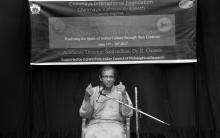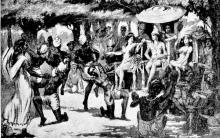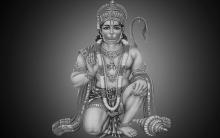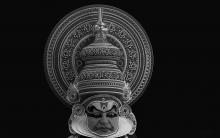Chinmaya Vishwavidyapeeth and Chinmaya International Foundation have jointly organized a ten-day Summer School from 17 to 26 June, 2017 to realize the spirit of Indian culture through the creations of Vyāsa, Vālmīki, Kālidāsa (and Guṇāḍhya) at the Adi Sankara Nilayam, Veliyanad. The Summer School is support by Indian Council of Philosophical Research. Prekshaa is delighted to present a daily summary of the discussions over the course of the next ten days.
Author:prekshaa
Lessons in Brahmasutra Commentary
I had requested Sri Shastri to instruct me in [Adi Shankara’s] commentary on the Brahmasutras[i]. Equally, I had requested him to train me in two or three other Vedanta commentaries that I hadn’t seen so far, and entreated him that I had set aside two years for this Shastric study. He said that that period was insufficient. I said, “Let it go on for two years; if required, we can extend it for an additional six months.”
Known as Kodagu in Kannada, Coorg is a picturesque hill-country forming the Southern tip of Karnataka. It forms the border between Karnataka and Kerala, and is in many ways, the gateway to the Malabar region in Kerala. Today it is primarily known for its scenic beauty and spectacular views of thickly-forested mountain ranges, valleys, waterfalls, and sprawling coffee estates.
Kautilya absorbed the best from the system of republics; he also brought back the ashvamedha conception of an empire. Both these conceptions have their roots in the Vedas. One must observe how broad and overarching the concept of yajna has been in the Hindu worldview. And one who is opposed to this broadminded concept of yajna is bound to face trouble. Philosophically, the inner yajna is superior to the external, ritualistic yajna but the former cannot exist without the latter. We need both.
Among the various methods of reasoning in Vedanta, the neti neti krama is an important one. It helps delineate the nature of the Self by pointing out what it is not. A well-known poem that uses this approach of ‘Not this, not this’ is the Nirvāṇa Ṣaṭkam. While the popular belief is that these six verses were composed by Śaṅkara, scholars like G C Pande and Swami Satchidanandendra Saraswati have opined that it is unlikely because several words used in this stotra have not been used regularly in his commentaries and other writings.
In pre-modern India, ‘Sāhitī-samarāṅgaṇa-sārvabhauma’ was a title conferred upon people who contributed in equal measure to the fields of literature and warfare. Our country boasts of a long list of achievers known for their physical and intellectual might, the significant ones being Chandragupta Vikramaditya, Yashovarma, Bhojaraja, and Krishnadevaraya. Bhoja is one of India’s least celebrated kings. This reveals a poverty of gratitude, which is one of the unfortunate ills of present-day India.
Around 1922, Hanagal Virupaksha Shastri was a Vidwan in the Shankara Matha in Bangalore. He taught Advaita Vedanta. Back then his colleague was “Mimamsakanteerava” Vaidyanatha Shastri. He taught Purvamimamsa.
संस्कृते विद्यमानानि विविधानि शास्त्राणि
सन्ति नैकानि शास्त्राण्यैहिकान्यामुष्मिकानि संस्कृते विद्यमानानि। एतेषां सर्वेषां परामर्शनं नाम बहुसमयग्रसिष्ण्विति मत्वा केवलं शृङ्गग्राहिकया भङ्ग्या कतिपयविद्यानामेव परिमितविधौ विवेचनं शक्यम्। एतेषु भाषा-व्याकरणयोः प्रायः पूर्वमेव किञ्चिदिव परामृष्टमिति मुख्यतयावशिष्टानि प्रस्तुतकालेऽपि यथावत्प्रयोजकानि कतिचिद्विलोकयामः।
ಪ್ರತಿಯೊಂದು ಕಲೆಗೂ ತನ್ನದೇ ಆದ ಶೈಲಿಯಿರುತ್ತದೆ. ಅಷ್ಟೇಕೆ, ಪ್ರತಿಯೊಬ್ಬ ವ್ಯಕ್ತಿಗೂ ಜೀವಿಗೂ ಅಸ್ತಿತ್ವಕ್ಕೂ ತನ್ನದೇ ಆದ ಶೈಲಿಯಿರುವಾಗ ವ್ಯಕ್ತಿಜೀವನಸಮಷ್ಟಿಯೆನಿಸಿದ ಸಮಾಜವೊಂದರ ವಿಕಸಿತವೂ ಮನೋಹರವೂ ಆದ ಕಲಾಪ್ರಕಾರವೊಂದಕ್ಕೆ ಶೈಲಿಯ ಅನನ್ಯತೆಯಿಲ್ಲವೆಂದರೆ ಹೇಗೆ? ಹೀಗಾಗಿಯೇ ನರ್ತನಕಲೆಗೂ ಶೈಲಿಗಳ ಅನನ್ಯರೂಪಗಳುಂಟು; ಮತ್ತಿದಕ್ಕೆ ಭಾರತೀಯನೃತ್ಯಗಳು ಅಪವಾದವೇನಲ್ಲ.
"भारतस्य प्रतिष्ठे द्वे संस्कृतं संस्कृतिस्तथा"
"संस्कृतं नाम दैवी वागन्वाख्याता महर्षिभिः"
शास्त्र-काव्यप्रतिभाविलासानां व्यक्तीकरणाय परमं माध्यमं संस्कृतम्










